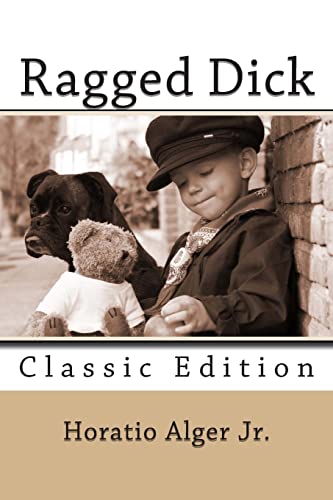"From shoeshine boy to self-made young man—an American classic of grit, character, and the power of perseverance."
In Ragged Dick, Horatio Alger introduces readers to 14-year-old Richard "Ragged Dick" Hunter, a clever and street-savvy bootblack surviving in the bustling streets of 1860s New York City. Orphaned at a young age and sleeping in boxes, Dick earns his pennies shining shoes—but dreams of something better. His life begins to change when he meets Frank Whitney, a wealthy boy who inspires Dick to pursue education, discipline, and virtue.
As Dick strives to rise from poverty, he befriends Henry Fosdick, an educated boy down on his luck, and the two form a partnership that opens doors to respectability and success. With a blend of humor, honesty, and determination, Dick earns his place in society—proof that integrity and effort can change a life.
Celebrated as a defining “rags-to-riches” story, this inspiring novel captured the spirit of post-Civil War America and continues to resonate with readers of all ages.
Perfect for readers who enjoy:
✔ Historical adventure
✔ Coming-of-age tales
✔ Inspirational classics
✔ Themes of character and self-improvement
Horatio Alger, Jr. (1834–1899) was a prolific 19th-century American author, best known for his many formulaic juvenile novels about impoverished boys and their rise from humble backgrounds to lives of respectable middle-class security and comfort through hard work, determination, courage, and honesty. He initially wrote and published for adults, but a friendship with boys' author William Taylor Adams led him to writing for the young. He published for years in Adams's Student and Schoolmate, a boys' magazine of moral writings. His lifelong theme of "rags to respectability" had a profound impact on America in the Gilded Age. His works gained even greater popularity following his death, but gradually lost reader interest in the 1920s. Gary Scharnhorst, author of Horatio Alger, Jr., describes Alger's style as "anachronistic", "often laughable", "distinctive", and "distinguished by the quality of its literary allusions." These allusions are what set his work apart from the pulps, Scharnhorst opines, and include the Bible, Shakespeare (in half his books), John Milton, Longfellow, Cicero, Horace, Joseph Addison, Oliver Goldsmith, Alexander Pope, Thomas Gray, William Cowper, and many others. "By the diversity of his allusions," Scharnhorst writes, "Alger ... both revealed his erudition and enhanced the literary quality of his work."
